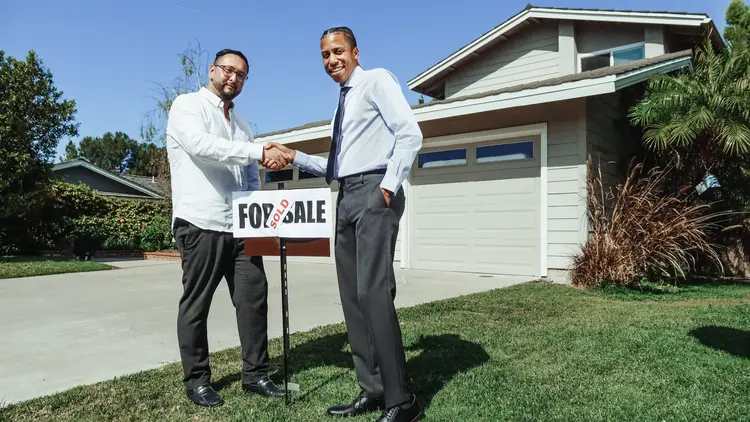

Hello, aspiring real estate moguls! Are you wondering, “Can you take a real estate course online?” Spoiler alert: Yes, you can! And guess what? It’s as exciting as binge-watching your favorite TV series, but with the bonus of catapulting you into the world of real estate!
Imagine learning about the latest in real estate while lounging in your pajamas. That’s the beauty of online real estate schools. They offer the freedom to learn at your own pace, on your own schedule. You could be sipping coffee at your kitchen table or waiting for your dentist appointment while diving into the nuances of property laws. The flexibility is simply unmatched!
Cost-wise, online real estate courses are like finding a designer dress on sale – high value at a lower cost. Why? No in-person classes mean fewer overhead costs for the schools, which translates to more affordable options for you. Plus, you save on commuting time and costs. It’s a win-win!
Online courses aren’t just about convenience; they’re about personalization. Struggling with a concept? Rewatch the video lessons. Need more time on a topic? No problem. This tailored approach suits various learning styles, ensuring you grasp every concept like a pro.

Getting your real estate license online is more than just a few clicks. It involves engaging with interactive courses, comprehensive study materials, and possibly some audio lessons. You’ll learn everything from property management to negotiation tactics. And the best part? You can do it all from your cozy couch.
Preparing for the real estate exam online is like having an expert tutor available 24/7. These courses are designed to not only teach you but also to prepare you for the state exam. With practice tests, exam prep resources, and even instructor support, you’re setting yourself up for success.
Not all online real estate schools are created equal. Look for an approved education provider with good standing with organizations like the Better Business Bureau. Check out schools like Colibri Real Estate, CE Shop, or RealEstateU, and compare their course offerings, fees, and packages. Remember, it’s like picking a Netflix show – choose the one that intrigues you the most!
The #1 to make money online with TikTok Search (FREE TRAINING)

Pursuing a career in real estate in the United States presents an exciting opportunity filled with potential for growth and success. The journey to becoming a licensed real estate agent involves specific educational requirements, certifications, and examinations, many of which can be fulfilled through online courses.
The first step is to understand that real estate licensing requirements vary by state. Each state has its own real estate commission that sets the rules for licensure. This means the required courses, the number of education hours, and the exams differ. Before enrolling in any course, ensure it is approved by the real estate commission of the state where you plan to work.
Most states require aspiring real estate agents to complete pre-licensing education courses. These courses cover a range of topics, including:
Several accredited institutions and real estate schools offer these courses online, providing flexibility for those who cannot attend in-person classes. Ensure that the course provider is accredited by your state’s real estate commission.

After completing the pre-licensing education, candidates must pass a state-specific real estate licensing exam. This exam typically includes both national and state-specific sections, covering topics such as real estate laws, property management, real estate calculations, and sales contracts.
To prepare for this exam, many candidates enroll in online exam preparation courses. These prep courses provide practice tests, study materials, and tips to help you succeed.
Once licensed, real estate agents often need to complete post-licensing education within a certain timeframe. Additionally, to maintain their license, agents must complete continuing education (CE) courses regularly. These requirements vary by state. Online CE courses are widely available and cover various topics, including ethics, fair housing, and emerging real estate trends.
When selecting an online course provider, consider the following:
While not always required, obtaining additional certifications or designations can enhance a real estate agent’s career. These include:
These designations are offered by various real estate organizations and typically require additional coursework and passing an exam.
Becoming a real estate agent in the U.S. requires commitment to education and a willingness to adhere to state-specific licensing requirements. Online courses offer a convenient and flexible way to achieve the necessary education, from pre-licensing to continuing education. By choosing the right course provider and staying informed about the latest industry standards and regulations, aspiring real estate agents can successfully navigate their path to a rewarding career in real estate.

In the United States, the process of earning a real estate license is managed at the state level, meaning you would need to go through the licensing process in the specific state where you intend to practice real estate. Here’s a general outline of where and how you can earn your real estate license in the U.S.:
Remember, the requirements for obtaining a real estate license – such as the number of educational hours, the specific coursework, and the format of the licensing exam – vary significantly from state to state. It’s important to follow the guidelines provided by the regulatory body in the state where you plan to become licensed.

In the fast-paced world we live in, balancing education with other responsibilities can be a juggling act. Online real estate classes give you more flexibility. Whether you’re a night owl or an early bird, you can tailor your study schedule to fit your lifestyle.
Every state has different requirements for real estate licensing. Online schools offer a variety of courses to meet these diverse needs. From pre licensing education to continuing education, you’re covered. It’s like having a buffet of educational options at your fingertips!
Gone are the days of droning lectures and stuffy classrooms. Online classes are interactive, engaging, and sometimes even fun. With formats like live online sessions, mobile apps, and even post-licensing courses, the learning environment is dynamic and stimulating.

The real estate industry, brimming with nuances and complexities, offers immense opportunities for professional growth and development. In this digital age, experienced real estate agents have a unique opportunity to share their expertise through online courses, benefiting aspiring agents and enriching the industry as a whole.
The #1 to make money online with TikTok Search (FREE TRAINING)

Teach.io emerges as an ideal platform for real estate professionals looking to create and offer online courses. Here’s why:
By creating online courses, real estate professionals can not only contribute to the growth of upcoming agents but also establish themselves as thought leaders in the industry. Platforms like Teach.io offer the necessary tools and community support to make this journey successful and rewarding.
So, to wrap it up, can you take real estate classes online? Absolutely! It’s an exciting, flexible, and accessible way to jumpstart your real estate career. With online school, you’re not just studying; you’re embarking on an adventure in the comfort of your own home. So, grab your laptop, find a comfy spot, and start your journey to becoming a licensed real estate agent today!
Remember, education is a journey, not a race. Take your time, enjoy the process, and before you know it, you’ll be helping people find their dream homes or investing in properties like a seasoned pro. The world of real estate awaits, and it’s just a click away!
For further reading on online education, check out these insightful articles:
Happy learning, future real estate stars!
(Note: This article is an educational piece and should be used as a guide. Please conduct thorough research and consult with educational professionals for specific guidance related to online real estate courses.)





